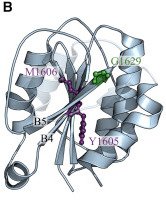Cut it, but not so fast!

Blood clotting is an amazing biological process in which injured blood vessels are plugged by platelets –flowing in our blood stream– to stop bleeding. Platelets however need of a “molecular tape” to adhere at the site of injury. Once the plug has been formed, and the injured site is closed, a molecular scissor cuts the tape, to prevent the endless growth of the plug that could dangerously block the entire vessel. The tape is a protein called von Willebrand factor (or simply VWF) and the scissor a protease named ADAMTS13. In a multidisciplinary study, combining atomistic simulations and experiments, we clarify how a small alteration in the molecular tape (VWF) can lead to a dramatic acceleration of the cutting process by ADAMTS13, thereby resulting in unwanted bleeding. This information proves valuable for the development of highly sensitive tools that can be used in clinical diagnosis.
Related publication:
C Aponte-Santamaría, S Lippok, J Mittag, T Obser, R Schneppenheim, C Baldauf, F Gräter, U Buddee, and JO Rädler. Mutation G1629E increases von Willebrand factor cleavage via a cooperative destabilization mechanism. Biophys. J. 112: 57-65.10 January 2017 (link)
About HITS
HITS, the Heidelberg Institute for Theoretical Studies, was established in 2010 by physicist and SAP co-founder Klaus Tschira (1940-2015) and the Klaus Tschira Foundation as a private, non-profit research institute. HITS conducts basic research in the natural, mathematical, and computer sciences. Major research directions include complex simulations across scales, making sense of data, and enabling science via computational research. Application areas range from molecular biology to astrophysics. An essential characteristic of the Institute is interdisciplinarity, implemented in numerous cross-group and cross-disciplinary projects. The base funding of HITS is provided by the Klaus Tschira Foundation.